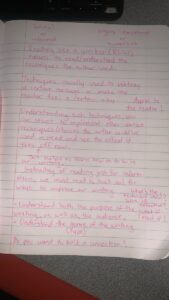When Bunn writes “You’re already an author”, he’s trying to somewhat comfort the reader. Not everyone considers themself to be a writer, let alone author. It makes the reader more open to listening and learning what he has to say. We write texts and emails already on a daily basis. We know how to format words into sentences, and sentences into paragraphs, like what Bunn said. We can use our knowledge to relate to how we can read like writers.
I noticed that Bunn created a setting in the beginning of the essay. He put a lot of detail into the setting, getting the reader’s attention. I feel like it was effective being that I was more interested in continuing the read because of the first couple of paragraphs. The only disadvantage I noticed is that it’s a little disappointing when you continue reading. The first couple of paragraphs are almost like if a story is about to be told. And the essay isn’t a fictional story. But I’d take the risk and use that technique because I feel like it was mostly effective, and I personally like it.




